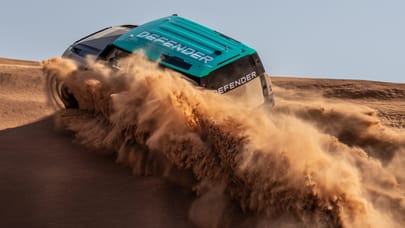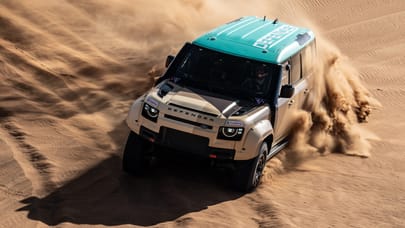
Jaguar, Land Rover news - The great British takeaway?
So, after a year of uncertainty, Jaguar and Land Rover have been offloaded by Ford. Tata has just agreed to pay about £1.5 billion for the two brands.
Ford will continue to supply engines, transmissions and a host of other components, at least for the foreseeable future. So for the moment you won't notice any change. Same cars, same factories.
Jaguar and Land Rover have always made a fuss about being British. Even when they were both owned by Ford of the USA. Or, before that, when Land Rover was owned by BMW of Germany. So it shouldn't be all that hard to accept that they're now owned by Tata of India.
Tata has said it will leave the British management to get on with it. 'We are neither interventionist nor integrationist,' they say. Translation: we won't meddle, and we won't slap a Jaguar grille on a Tata Nano.
Right now, the issue isn't Jaguar-Land Rover becoming too Indian. The issue is, how well can JLR do as an independent car company?
Tata is very rich, a conglomerate that turns over some £15 billion a year and, in Britain, owns Corus (formerly British steel) and Tetley Tea and some very swanky London hotels. It also has Tata Motors, the company that recently hit the headlines for launching the Nano, the world's cheapest car. It's also India's biggest truck maker.
But let's face it these are hardly huge synergies. There's not a whole lot in common between a Nano and a long-wheelbase Jag XJR. Nor between a basic Indian pickup and a Range Rover. So you can't say JLR will be part of a global car company. You have to look at JLR as an Indian-owned British independent.
But Tata has said it will invest. Investment is what it takes: not the £1.5 billion to buy the companies, but the billions after that to fund new-car development and keep the factories up to date.
That near-insatiable appetite for ongoing investment was just what scared Ford into selling. Any available cash Ford had was desperately needed to develop new Ford cars in the USA, where they're deep in the cack.
Top Gear
Newsletter
Thank you for subscribing to our newsletter. Look out for your regular round-up of news, reviews and offers in your inbox.
Get all the latest news, reviews and exclusives, direct to your inbox.
JLR faces difficulties because it's a small car company. How small?
Between them Jaguar and Land Rover's total output is a third of Mercedes' or BMW's.
That means when they need to develop bruisingly expensive new technology (and they need green technology badly), the cost can't be spread over so many cars. And JLR can't do the same kind of bulk-buying of components as the Germans do. It's boring, but that sort of thing does matter for the financial health of any car company.
But there's something far more important for their health than that. Making cars that people want to buy, so that the factories work flat-out.
To do this Jag needs to get a beautiful new XJ that people actually recognise as a modern car, rather than the present XJ, which is modern but doesn't look it. And that vital new XJ is planned for launch in three years - Tata is promising the money.
And Land Rover can keep the showrooms - and the Halewood factory - busy by launching an extra model. That's the production version of the LRX show car. Again, Tata's billions will fund it.
So if Tata sticks to its word - and it has a habit of doing just that - the change of ownership should mean stability, rather than turmoil. At least for the foreseeable.
Trending this week
- Car Review
BMW 1 Series








